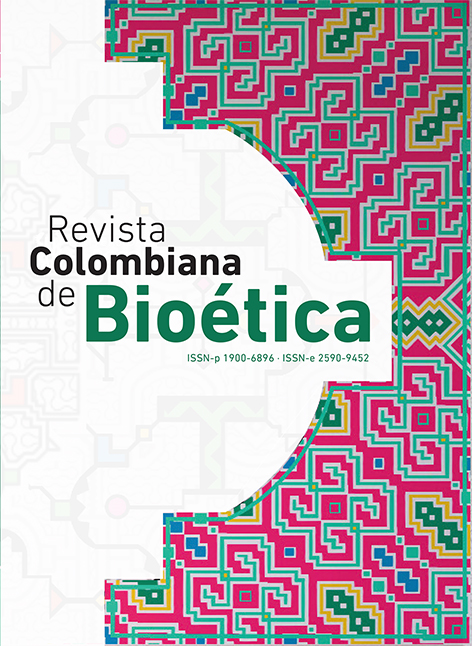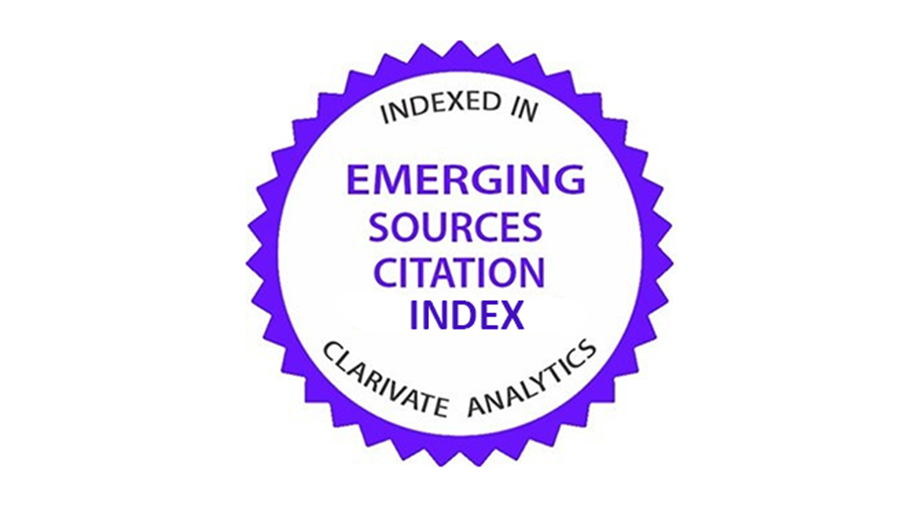The interpersonal component of the personal condition: between attitudes of recognition and the inclusion of people with disabilities
DOI:
https://doi.org/10.18270/rcb.v17i2.3750Keywords:
disability, people with disabilities, social inclusion, social exclusion, human relationsAbstract
Purpose/Background. Discuss the interpersonal component of the personal condition, showing how recognition attitudes determine the social inclusion of people with disabilities.
Methodology/Approach. A theoretical analysis was carried out on the interpersonal component of the human person, based on the argument of the inclusion of people with disabilities and its relevance for full citizen participation. The research is framed in the interpretive paradigm, with a qualitative nature, using as a technique the analysis of documents considered primary sources. Likewise, the theoretical approach of Paul Ricoeur regarding the forms of human recognition and the three basic forms of interpersonal recognition proposed by Axel Honneth were assumed.
Results/Findings. The interpersonal dimension is an important foundation of existence as a human community. The basic forms of recognition are reciprocal and, therefore, not unidirectional and coincide with being respected, loved, and valued for our contribution to the community. Living with people who do not have attitudes of recognition towards you is a reality with which people with disabilities are familiar.
Discussion/Conclusions/Contributions. To fully include people with disabilities, in addition to considering the modality of institutional and technical participation, it must consider the interpersonal dimension.
Downloads
References
Asamblea General de las Naciones Unidas. 2013. “Outcome document of the high-level meeting of the General Assembly on the realization of the Millennium Development Goals and other internationally agreed development goals for persons with disabilities: the way forward, a disability-inclusive development agenda towards 2015 and beyond.” Nueva York: Naciones Unidas. https://digitallibrary.un.org/record/764438
Bach, Michael. 2002. “Social Inclusion as Solidarity: Rethinking the Child Rights Agenda.” The Laidlaw Foundation. https://laidlawfdn.org/assets/wpsosi_2002_june_social-inclusion-as-solidarity-1.pdf
Bredewold, Femmianne, Evelien Tonkens y Margo Trappenburg. 2016. “Urban encounters limited: The importance of built-in boundaries in contacts between people with intellectual or psychiatric disabilities and their neighbours.” Urban Studies 53, no. 16: 3371-87. https://doi.org/10.1177/0042098015616895
Buber, Martin. 2017. Yo y tú. Barcelona: Herder Editorial.
Calderón-Almendros, Ignacio, Mel Ainscow, Silvia Bersanelli y Pamela Molina-Toledo. 2020. “Educational inclusion and equity in Latin America: An analysis of the challenges.” Prospects 49, no. 3: 169-86. https://doi.org/10.1007/s11125-020-09501-1
Congdon, Matthew. 2020. “The struggle for recognition of what?” European Journal of Philosophy 28, no. 3: 586-601. https://doi.org/10.1111/ejop.12525
Enriquez Canto, Yordanis. 2018a. “Discapacidad: una heurística para la condición humana”. Revista bioética 18, no. 26(2): 207-16. https://doi.org/10.1590/1983-80422018262241
Enriquez Canto, Yordanis. 2018b. “Estatus personal en la discapacidad intelectual: considerando las capacidades cognitivas.” Revista Latinoamericana de Bioética 18, no. 35(2): 226-41.
Forst, Rainer. 2017. Normativity and power: Analyzing social orders of justification. Reino Unido: Oxford University Press.
Fowers, Blaine y Austen R. Anderson. 2018. “Aristotelian philia, contemporary friendship, and some resources for studying close relationships.” En The theory and practice of virtue education, editado por Tom Harrison y David Ian Walker, 184-196. Inglaterra: Routledge.
Frankfurt, Harry G. 2004. The reasons of love. Estados Unidos: Princeton University Press.
Fraser, Nancy y Axel Honneth. 2003. Redistribution or recognition?: a political-philosophical exchange. Estados Unidos: Verso.
Goodley, Dan. 2016. Disability studies: An interdisciplinary introduction. Estados Unidos: Sage.
Hernández-Sampieri, Roberto, Carlos Fernández Collado y Pilar Baptista Lucio. 2018. Metodología de la investigación. Vol. 4. México: McGraw-Hill Interamericana.
Honneth, Axel. 1995. The Struggle for Recognition - The Moral and Political Grammar of Social Conflicts. Cambridge: Polity Press.
Honneth, Axel. 2008. Recognition - A New Look At An Old Ideal. Reino Unido: Oxford University Press.
Ikäheimo, Heikki y Arto Laitinen. 2017. “Analysing Recognition: Identification, Acknowledgement and Recognitive Attitudes Between Persons.” En: Recognition and Power: Axel Honneth and the Tradition of Critical Social Theory, editado por B. van den Brink & D. Owen, 33-56. Londres: Cambridge University Press.
Ikäheimo, Heikki. 2007. “Recognizing persons.” Journal of Consciousness Studies 14, no. 5-6: 224-47.
Ikäheimo, Heikki. 2009. “Personhood and the social inclusion of people with disabilities.” En Arguing about disability philosophical perspectives, editado por Kristiansen K., Vehmas S. y Shakespeare T., 77-92. Inglaterra: Routledge.
Kim, Kyung Mee, Yu Ri Shin, Dong Chul Yu y Dong Ki Kim. 2016. “The meaning of social inclusion for people with disabilities in South Korea.” International Journal of Disability, Development and Education 64, no. 1: 19-32. https://doi.org/10.1080/1034912X.2016.1165802
Kittay, E. F. y Carlson L. 2010. Cognitive disability and its challenge to moral philosophy. Reino Unido: John Wiley & Sons.
Laitinen, Arto. 2002. “Interpersonal recognition: A response to value or a precondition of personhood?.” Inquiry 45, no. 4: 463-78. https://doi.org/10.1080/002017402320947559
Maslow, Abraham y K. J. Lewis. 1987. “Maslow's hierarchy of needs.” Salenger Incorporated 14, no. 17: 987-90.
Mead, George Herbert. 2015. Mind, self, and society: The definitive edition. Estados Unidos: University of Chicago Press.
Nevala, Nina, Irmeli Pehkonen, Inka Koskela, Johanna Ruusuvuori y Heidi Anttila. 2015. “Workplace accommodation among persons with disabilities: a systematic review of its effectiveness and barriers or facilitators.” Journal of occupational rehabilitation 25, no. 2: 432-48. https://doi.org/10.1007/s10926-014-9548-z
ONU. 2006. “Convención sobre los derechos de las personas con discapacidad.” Art. 30; Numeral 2. https://www.un.org/esa/socdev/enable/documents/tccconvs.pdf
Pinilla-Roncancio, Mónica. 2018. “The reality of disability: Multidimensional poverty of people with disability and their families in Latin America.” Disability and health journal 11, no. 3: 398-404. https://doi.org/10.1016/j.dhjo.2017.12.007
Pols, Jeannette. 2016. “Analyzing social spaces: Relational citizenship for patients leaving mental health care institutions.” Medical Anthropology 35, no. 2: 177-92. https://doi.org/10.1080/01459740.2015.1101101
Quinn, G., Degener T. y Bruce A. 2002. Human rights and disability: The current use and future potential of United Nations human rights instruments in the context of disability. Suiza: United Nations Publications.
Ricoeur, Paul. 2004. Parcours de la reconnaissance. Paris: Stock.
Sen, Amartya. 2017. “What Do We Want From a Theory of Justice?” En Theories of Justice, editado por Tom Campbell y Alejandra Mancilla, 27-50. Nueva York: Routledge.
Sgreccia, Elio. 2013. “Persona humana y personalismo.” Cuadernos de bioética 24, no. 1: 115-23. https://www.redalyc.org/pdf/875/87527461012.pdf
Simplican, Stacy, Geraldine Leader, John Kosciulek y Michael Leahy. 2015. “Defining social inclusion of people with intellectual and developmental disabilities: An ecological model of social networks and community participation.” Research in developmental disabilities 38: 18-29. https://doi.org/10.1016/j.ridd.2014.10.008
Spaemann, Robert. 2007. Persons: The difference between 'someone' and 'something'. Inglaterra: Oxford University Press.
Thompson, Simon. 2006. Political Theory of Recognition: A Critical Introduction. Cambridge: Polity Press.
Titchkosky, Tanya. 2014. “Monitoring disability: The question of the 'human'. in human rights projects.” En: Disability, human rights and the limits of humanitarianism, editado por Gill M y Schlund-Vials C. J., 119-35. Nueva York: Routledge.
Unicef. 2019. “Children and adolescents with disabilities”. Panama: Unicef. https://www.unicef.org/lac/en/children-and-adolescents-disabilities
Yeo, Rebecca y Karen Moore. 2003. “Including disabled people in poverty reduction work: ‘Nothing about us, without us’.” World development 31, no. 3: 571-90. https://doi.org/10.1016/S0305-750X(02)00218-8
Downloads
Published
How to Cite
Issue
Section
License
Copyright (c) 2022 Revista Colombiana de Bioética

This work is licensed under a Creative Commons Attribution-NonCommercial-NoDerivatives 4.0 International License.

Esta obra está bajo licencia internacional Creative Commons Reconocimiento-NoComercial-SinObrasDerivadas 4.0.















